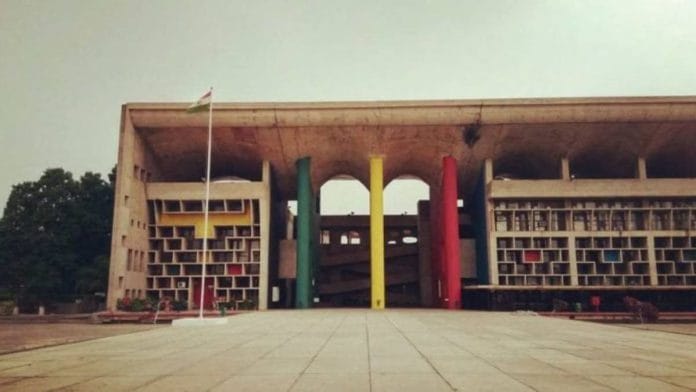New Delhi: The Punjab and Haryana High Court has set aside the compulsory retirement of judicial officer Dr Shiva Sharma in 2011, coming down heavily on its former judge Alok Singh for branding Sharma of “doubtful integrity” without inquiry or evidence. It declared the retirement order passed by the Governor of Haryana on the HC’s recommendation as “vitiated by illegality, impropriety and mala fide in law”.
A division bench of Chief Justice Sheel Nagu and Justice Sanjiv Berry was hearing Sharma’s plea challenging his retirement order which stated that he was “unfit to be retained in service at the age of 58 years”. This was after Justice Singh held Sharma as “unfit” for service while reviewing his performance for 2010-2011.
In its 12-page verdict delivered Monday, the HC bench noted that a retirement order “has to be issued only after due application of mind, to the relevant material/evidence available on record. While assessing an officer to be entitled or not, the concerned competent authority needs to scrutinise the entire service records of the officer right from the initial appointment up to the last appraisal year”.
The court went on to review Sharma’s service record and found that throughout his three-decade career, there was no negative assessment against him except in the final year of his service. Despite a clean career, he was removed, the court said, adding the adverse integrity grading against him was neither verified nor backed by inquiry.
“The competent authority in all probability did not notice the element of mala fide in law, which became palpable in the present case, especially on the part of the administrative judge, who recorded adverse remarks in the last five months of the ACR (annual confidential report) of petitioner, for the appraisal year 2010-2011,” the court observed.
Setting aside the compulsory retirement order against Sharma, the bench granted him all consequential benefits, including pension fixation, though not salary arrears, for the years out of service.
Also Read: ‘Worse than impeachment’—Legal fraternity on SC’s removal of Allahabad HC judge from criminal roster
Judge’s review & court view
Dr Shiva Sharma began his career as a member of the Haryana Civil Services (judicial branch) on 11 May, 1981, joining as a civil judge, junior division.
He was promoted as additional senior subordinate judge between 1986 and 1997, became an additional district judge on 30 July, 1997, and was designated as district & sessions judge in 2009. Over his three-decade career, he received predominantly “Good” or “Very Good” rating in his performance appraisal ACRs, the high court noted in its order.
It further observed that Sharma’s promotions and designation as district & sessions judge involved scrutiny of his ACRs and interaction with a selection committee, effectively rendering any prior adverse remarks, if any, as “insignificant and inconsequential”.
“Though there are few adverse remarks recorded in earlier part of the career of petitioner i.e. for the year 1989 to 1990, 1993 to 1994 and 1994 to1995, the same were washed out and lost their sting upon promotion of the petitioner from civil judge (senior division) to the post of additional district & sessions judge in the month of July 1997,” the HC order notes.
The main contention revolved around Sharma’s ACR for appraisal year 2010-2011, where he received a “C-Integrity Doubtful” grading that was recorded by Justice Singh, who was his administrative judge for a period of just five months, from 1 November, 2010, to 31 March, 2011. The previous administrative judge had not recorded remarks for the initial seven months of the appraisal year, the order notes.
Despite the “Integrity Doubtful” grading, the same ACR also categorised Sharma’s “Quality of Judgment” as “Good” and “Quantity of Work” as “Very Good”.
Justice Singh, however, noted issues with “management, leadership, initiative, and interpersonal relationships” of the judge.
“There are number of complaints against the officer by the members of the bar and public, but none is substantiated by any evidence. General reputation among the bar, public and officers’ fraternity is not good. Needs a close watch. Seems to be doubtful,” states the last ACR of Sharma.
The HC, however, found it difficult to comprehend that Justice Alok Singh “found that an officer who had rendered ‘Good’ or ‘Very Good’ performance in his entire 30 years of service, suddenly became an officer of worst reputation with his ‘Integrity Doubtful’ who exercises discriminatory tactics while recording remarks in the ACRs of subordinate judicial officers”.
“All these adverse remarks written in the last five months of the appraisal year 2010-2011 were not based on any written complaints or verified material or any overt or covert inquiry, but on unsubstantiated material/evidence/allegations,” it adds.
The HC bench criticised Justice Singh’s approach, stating: “The least which the then administrative judge ought to have done, is to conduct a covert vigilance inquiry… if such an inquiry would have revealed, some prima facie material of petitioner having committed misconduct, then proper course would have been to initiate a regular inquiry… None of these steps were adopted”.
“Instead, the short-cut method was adopted by declaring the petitioner to be unfit to be retained in service at the age of 58 years, by way of compulsory retirement in public interest”.
To consider irrelevant material and then take a decision, the court noted, is “abhorrent to the Wednesbury principle” and “mala fide in law”. The Wednesbury principle, derived from a 1948 English law case, allows courts to strike down administrative decisions that are so unreasonable that no reasonable authority could have made them.
Consequently, the HC overturned the 2011 retirement order against Dr Shiva Sharma.
(Edited by Nida Fatima Siddiqui)
Also Read: Why Punjab & Haryana HC refused to quash defamation case against Kangana for farmers’ protest remark






